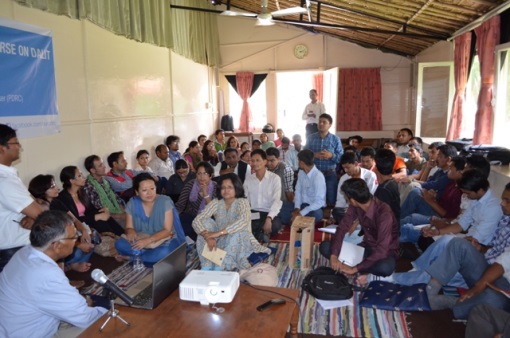
Kathmandu, 20 June 2013- Delivering a thought-provoking presentation on an interaction program organized by PDRC, prominent political columnist CK Lal compared and contrasted the features of the different social and political movement of Nepal. Given the social context, values, and spatiotemporal realities, Mr. Lal argued that different social movements cannot be weighed in a value-neutral way; we have to acknowledge every movement’s singular identity, unique methodologies, and intrinsic worth. He also added that every progressive movement has a positive impact in the long run, even if it has regressive immediate effect.
According to Mr. Lal, the social movement is a voluntary and spontaneous process that tends to bind people with shared values to be engaged to bring a change or to resist a change. He attempted to trace back the history of Nepali social movements: that goes back to the time of the legendary Bise Nagarchi, Yogmaya and Lakhan Thapa. Then he discussed the major movements of Nepal that started from the decade of the 50s and took a different turn in every preceding decade.
He assessed that generally, social movements in Nepal go through four different stages, namely- emergence, coalescence, bureaucratization, and decline. He claimed that the earliest social movement of Nepal initiated by the erstwhile political parties -guided by the functionalist social worldview- has already reached its phase of decline. The Maoist movement has reached a phase of ‘bureaucratization’ as it has meshed itself into a tiring system and has slipped away from the reach of common people. Janjati’s movement of Nepal is close to the phase of coalescence as it has gained some momentum yet it is suffering from the diffuse effect and lack of cohesion.
Since the forerunners of the Women’s movement of Nepal are from rich and elite families, Mr. Lal claimed it is the least inclusive movement of Nepal. Women’s issues of Nepal have got the privilege of reaching to the court before they reach the street. Madhesi movement of Nepal is still in the phase of emergence because Mr. Lal believes that it still has a long way to go. He stated that the Madheshi movement was triggered by last bus realization in 2006-2007, incitement of anti-Maoist Pahadi elites, minor Terai elites, strong propaganda value, sensitized middle class and the remittance beneficiaries who were seeking for an exalted social status to go with their newfound wealth through remittance. He predicted that the fruit of the Madheshi movement will be reaped by future generations if not by the current one.
CK Lal lamented the lack of cohesion in the Dalit movement as there is little coordination among Pahadi and Madhesi Dalits. He pointed at the language and cultural barrier behind the reason of this fraught cohesion. Since there is no issue equivalent to caste-based discrimination in the international scenario, the Dalit movement lacks international network which could have backed it up firmly. Likewise, he blamed the incessant cooptation process that lures Dalit leaders with different opportunities that distract them from the higher goal and impact the movement adversely. The major challenge for the Dalit movement of Nepal is the lack of unity of command and strong leadership, according to him.
He emphasized that the institutionalization of the lessons from the failure of a movement is equally important as institutionalizing the success of the same. Recommending the Dalit movement that it should prepare the visionary leaders-like Ambedkar and Mayavati of India- Lal proposed that forming a political party of Dalit people would be a better idea. Finally borrowing the proposition of Ambedkar, he presented that educating, organizing and then encouraging people to build networks and to resist the withdrawal options can be the strategies Dalit movement can opt for its future action.
The presentation was followed by a number of commentaries and questions. The talk program is a part of PDRC’s ‘Academic and Intellectual Discourse’ program. It was emceed by the AI discourse team leader Dr. Tara Lal Shrestha and it was closed with a remark from PDRC President Ms. Kamala Hemchuri.
Copyright © PDRC 2020 | All rights reserved.
Designed and Maintained by Code Logic Technologies Pvt. Ltd.